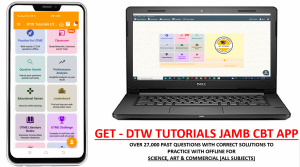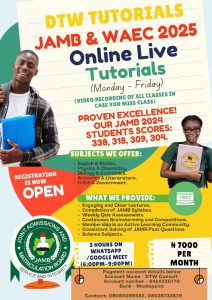GENRES OF LITERATURE
1.1 DRAMA
Drama comes from Greek words meaning “to do” or “to act.” A play is a story acted out. Plays show people going through some eventful period in their lives, seriously or humorously. The speech and action of a play recreate the flow of human life. A play comes fully to life only on the stage.
To get your E-Book PDF Download( 92 pages) of the entire Literature Key Points to
quickly prep for JAMB & WAEC purchase here for N500 – https://dtwedustore.com/shop/literature-key-points-by-dtw-tutorials-e-book-92-pages
TYPES OF DRAMA
- Tragedy: Tragedy is often an historical drama featuring the downfall of a great man.
- Comedy: When we talk about comedy, we usually refer to plays that are light in tone, and that typically have happy endings. r.
- Farce: Farce is a subcategory of comedy, characterized by greatly exaggerated characters and situations.
- Tragic-comedy: Tragic comedy is a play that starts with a tragedy and ends with a happy ending.
- Melodrama: Melodrama is another type of exaggerated drama. As farce, the characters tend to be simplified and one-dimensional. The formulaic storyline of the classic melodrama typically involves a villain heroine, and a hero who must rescue then heroine from the villain.
- Musical: This can also be called Opera. In musical theater or Opera, the story is told not only through dialogue and acting but through music and dance.
- Playlet: A play is a form of literature written by a playwright, usually consisting of scripted dialogue between characters, intended for theatrical performance rather than just reading.
- Mime: This is also known as drama without active speech. The characters here convey their message with expressions, gestures, and sounds. Physical movements and dance numbers can be used here as long as there isn’t speech involved. Ex; Sango by Duro Ladipo.
- Political Drama: Political dramas center around political conflicts, ideologies, and power struggles. They can focus on individuals, groups, or entire societies dealing with political issues. Example: George Orwell’s “Animal Farm” uses allegory to portray the rise of totalitarianism and the corruption of political ideals through the actions of farm animals.
DRAMATIC TECHNIQUES OR FEATURES OF DRAMA
- Cast: A cast includes every person who played any character in the drama.
- Playwright: This is the person who creates the dramatic piece. It could be just one person or more.
- Protagonist: The entire story usually revolves around this character.
- Antagonist: The character plays an opposite role from the protagonist. He/she is oftentimes the villain in the story or narrative.
- Conflict: This is the central cause for rivalry between the opposing characters.
- Soliloquy: This dramatic device is often to give the audience a glimpse at the character’s intentions by making them speak their thoughts out loud.
- Tragic flaw: In order to thicken the plot and get the audience more invested in the story, the protagonist is made to act in a certain way that rubs the audience the wrong way.
- Prologue: This is the beginning of the play. It offers an introduction to the body of the drama.
- Epilogue: This is usually the last part of a drama that ties up loose ends in the plot.
- Flashback: This device is used to return to a past occurrence to offer the audience a reason for the actions of any character(s).
- Action in drama refers to the progression of the plot from one moment to the next.
- Audience: These are the readers or those that watch the actors and actresses perform.
- Character: In drama, a character is a fictional person or being who appears in the play or story
- Climax: Significant moments of tension and conflict, usually involving two or more characters and having significant consequences for the outcome of the story.
- Contrast: Contrast is an important element of drama that helps to create interest and tension in a performance.
- Dialogue is the conversation and speech of the characters in a play or stage performance
- Monologue is a long speech being said by a character in order to give more details concerning him/her, other characters or better still the situation at hand in the play for the audience to have full knowledge of the situation.
- Language in drama and performance can be verbal, vocal, or non-verbal
- Mood: mood refers to the atmosphere or emotional tone of the play.
- Plot: Plot is the series of events that make up the story of a play.
- Setting: setting is the place and time in which the action of the play occurs.
- Structure: structure of a drama refers to the way in which the story is organized and presented
- Tension: Tension refers to the sense of conflict, suspense, or unease that is created in the audience through the events and actions of the story
1.2 PROSE
Prose refers to the literary or written form of the language of ordinary speech. Prose is a form of language that has no formal metrical structure. It applies a natural flow of speech, and ordinary grammatical structure rather than rhythmic structure, such as in the case of traditional poetry.
To get your E-Book PDF Download( 92 pages) of the entire Literature Key Points to
quickly prep for JAMB & WAEC purchase here for N500 – https://dtwedustore.com/shop/literature-key-points-by-dtw-tutorials-e-book-92-pages
TYPES OF PROSE
There are two main types of Prose, which are Fiction and Non-Fiction
1. Fiction: This is the form of any work that deals, in part or whole, with information or events that are not real, but rather, imaginary and theoretical, that is, invented by the author.
TYPES OF FICTION
- Mystery
- Fantasy
- Fable
- Allegory
- Parables
- Romance
- Folktales
- Creative writing
- Novel
- Historical novel
- Gothic novel
2. Non-fiction is another type of prose that is factual rather than imaginative in nature. Because it is more factual and less imaginative, it may use less figurative language.
TYPES OF NONFICTION
- Biography
- Autobiography
- Memoir
- Diary or Journal
- Essay
- Historical document or speech
- Documentary.
1.3 POETRY
Poetry is a type of literature that conveys a thought, describes a scene or tells a story in a concentrated, lyrical arrangement of words. Poems can be structured, with rhyming lines and meter, the rhythm and emphasis of a line based on syllabic beats. Poems can also be freeform, which follows no formal structure.
TYPES OF POETRY
- Blank verse. Blank verse is poetry written with a precise meter—almost always iambic pentameter—that does not rhyme.
- Rhymed poetry. In contrast to blank verse, rhymed poems rhyme by definition, although their scheme varies.
- Free verse. Free verse poetry is poetry that lacks a consistent rhyme scheme, metrical pattern, or musical form.
- Epics. An epic poem is a lengthy, narrative work of poetry. These long poems typically detail extraordinary feats and adventures of characters from a distant past.
- Narrative poetry. Similar to an epic, a narrative poem tells a story. Henry Wadsworth Longfellow’s “The Midnight Ride of Paul Revere” and Samuel Taylor Coleridge’s “The Rime of the Ancient Mariner” exemplify this form
- Haiku. A haiku is a three-line poetic form originating in Japan. The first line has five syllables, the second line has seven syllables, and the third line again has five syllables.
- Pastoral poetry. A pastoral poem is one that concerns the natural world, rural life, and landscapes. These poems have persevered from Ancient Greece (in the poetry of Hesiod) to Ancient Rome (Virgil) to the present day (Gary Snyder).
- Sonnet. A sonnet is a 14-line poem, typically (but not exclusively) concerning the topic of love. Sonnets contain internal rhymes within their 14 lines; the exact rhyme scheme depends on the style of a sonnet.
- Elegies. An elegy is a poem that reflects upon death or loss. Traditionally, it contains themes of mourning, loss, and reflection. However, it can also explore themes of redemption and consolation.
- Ballad. A ballad (or ballade) is a form of narrative verse that can be either poetic or musical. It typically follows a pattern of rhymed quatrains. From John Keats to Samuel Taylor Coleridge to Bob Dylan, it represents a melodious form of storytelling.
- Ode. Much like an elegy, an ode is a tribute to its subject, although the subject need not be dead—or even sentient.
- Limerick. A limerick is a five-line poem that consists of a single stanza, an AABBA rhyme scheme, and whose subject is a short, pithy tale or description.
- Lyric poetry. Lyric poetry refers to the broad category of poetry that concerns feelings and emotion. This distinguishes it from two other poetic categories: epic and dramatic.
- Soliloquy. A soliloquy is a monologue in which a character speaks to him or herself, expressing inner thoughts that an audience might not otherwise know. Soliloquies are not definitionally poems, although they often can be—most famously in the plays of William Shakespeare.
- Villanelle. A nineteen-line poem consisting of five tercets and a quatrain, with a highly specified internal rhyme scheme. Originally a variation on a pastoral, the villanelle has evolved to describe obsessions and other intense subject matters, as exemplified by Dylan Thomas, author of villanelles like “Do Not Go Gentle Into That Good Night.”
DTW Tutorials Study Resource Links;
First of All to obtain high JAMB &WAEC Scores, YOU HAVE TO Practice! Practice!! Practice!!
Use DTW JAMB & WAEC 2025 CBT Practice App!!!
– GET DTW TUTORIALS JAMB & WAEC 2025 CBT EXAM PRACTICE APP for all Subjects with over 31,000 Past Questions and Correct Solutions to Practice with offline! (Activation cost is N4000 for 1 year) Download Links Below for Mobile Phones & Laptop Computer;
DTW TUTORIALS JAMB 2025 APP For MOBILE Phone Direct Download link;https://play.google.com/store/apps/details?id=com.iafsawii.dtw.jamb
DTW TUTORIALS JAMB 2025 APP For DESKTOP Laptop Computer Direct Download link; https://drive.google.com/file/d/1iIHBoWjEeJeCFyTO9nt-9kAveH2FqjrT/view?usp=sharing
Download Links for WAEC 2025 App;

JAMB RESOURCE LINKS BELOW;
– JAMB Past Questions Solved Playlists on Math, Phy, Chem; https://www.youtube.com/playlist?list=PLLgYU6fS5143-p4dfWIFL7keuB1SBgT2b
– THE LEKKI HEADMASTER – Summary, Questions And Answers (JAMB 2025 NOVEL); https://dtwtutorials.com/the-lekki-headmaster-jamb-2025-novel-summary-questions-and-answers-pdf-download/
– JAMB 2025 Recommended Text Books – https://dtwtutorials.com/jamb-2025-recommended-text-books-for-all-subjects/
– JAMB 2025 Syllabus all Subjects – https://dtwtutorials.com/jamb-2025-syllabus-free-download/
– JAMB 2025 Syllabus in 30 Days Timetable Challenge by DTW Tutorials for Science, Art & Commercial Subject Combinations – Cover Your JAMB Syllabus in 30 Days Challenge; https://dtwtutorials.com/jamb-2025-syllabus-in-30-days-timetable-challenge-by-dtw-tutorials-cover-your-jamb-syllabus-in-30-days-challenge/
– How to Manage Your Jamb Exam Time for High Scores; https://youtu.be/Tp4Va8haib8
– Physics Notes and Questions on All topics; https://dtwtutorials.com/category/tutorials/physics-tutorials/
– Chemistry Notes and Questions on All topics; https://dtwtutorials.com/category/tutorials/chemistry/
– How to Read, Understand and Remember Always- https://youtu.be/kL8BpRePudA
– How to Cover Your JAMB Syllabus Fast in 30 Days!!; https://youtu.be/RVgyn01Ptd0
– What to do a night before your Jamb Exam (+Exam Prayers); https://youtu.be/njbAx4Oz5Rw
– How to Manage Your Jamb Exam Time for High Scores; https://youtu.be/Tp4Va8haib8
– Overcoming Exam Fear/Anxiety– https://youtu.be/Uvf81rvd0ls
You can also join our online groups below for instant JAMB 2025 Updates;
Join DTW JAMB 2025 Intensive Tutorials Study Groups on Facebook, Telegram and WhatsApp Group;
Facebook Group – https://web.facebook.com/groups/dtwtutorialsgroup/
WhatsApp Group – https://chat.whatsapp.com/E8pprCQYtahKfpQN9UB0aU
Telegram Group – https://t.me/+AcXfhJPSIiI2ZTY0
WhatsApp Channel – https://whatsapp.com/channel/0029VaAWvTmDDmFT9o25dV3u
DTW JAMB 2025 Intensive Online Lessons/Tutorials
Online JAMB 2025 Tutorials – Your Path to Jamb Success!
Are you preparing for the JAMB 2025 Exam and aiming for excellence? Look no further than Online Jamb Tutorial by DTW Consult. We’re dedicated to helping you ace your Jamb with confidence.
- Why Choose DTW Online JAMB Intensive Tutorials?
• Engaging, Clear and Interactive Online Lectures
• Completion of JAMB Syllabus
• Weekly Quiz Assessments
• Continuous Brainstorming and Competitions
• Membership in an Active Learning Community
• Consistent Solving of JAMB Past Questions-
• Expert Jamb Instructors
• Comprehensive Study Materials - All Classes are Recorded!! In case you miss any class, and when you join us you will have access to all the previous class recorded videos!!!
• Subjects;
English
Physics
Chemistry
Biology
Math
Economics
Literature
Crs
Government
• Affordable Tuition – N7000 monthly (6pm – 10pm, Mon to Fri)
Lectures Ongoing! Register Now!!
Bank Details:
Account Name: DTW Consult
Account Number: 6414330770
Bank: Moniepoint
Amount – N7000
For easy payment and enrollment.
Proof of payment should be sent by WhatsApp.
Contact Us:
WhatsApp: 09085099582, 08038732879
Email: dtwconsultng@gmail.com
Take a step closer to your Jamb success with DTW Online Jamb 2025 Intensive Tutorials.
Let’s work together to unlock your full potential!

https://youtu.be/P7wtBH46ZMMnsive Tutorials. Let’s work together to unlock your full potential! #JambPrep #OnlineTutorial #DTWConsult #JambSuccess #jamb2025 #utme2025

No Comments